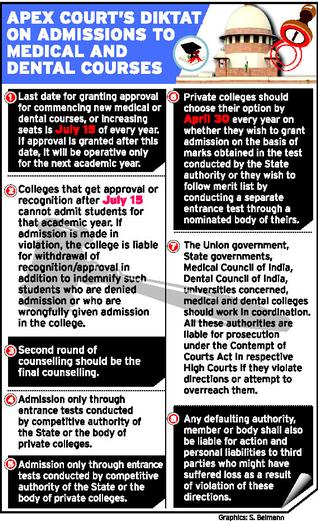The schedule for admissions to medical and dental courses will be in accordance with the directions issued by the Supreme Court last year in the Priya Gupta vs. State of Chhattisgarh and others case.
The State government and the Consortium of Medical, Engineering and Dental Colleges of Karnataka (COMEDK), which conducts the entrance test on behalf of private professional colleges, recently gave such an assurance to the Karnataka High Court during the hearing of a public interest litigation petition.
The petitioner had sought an inquiry into the alleged illegal admissions by some colleges in the guise of filling surrendered seats.
A Division Bench comprising Chief Justice D.H. Waghela and Justice B.V. Nagarathna disposed of the petition by recording the undertaking given on behalf of the State and the COMEDK.
It was pointed out that the Supreme Court in May last year issued directions to the authorities, including private medical and dental colleges, elaborating the time frame for admissions. The court said that any person could move High Courts against any authority or individual who violated its directions.
The State government informed the court that steps had been taken to prevent illegal admissions in the guise of filling surrendered seats.
The apex court, after noticing the tendency of colleges admitting candidates to medical and dental courses beyond the fixed timetables, in violation of the earlier issued directions, and the manifold increase in arbitrary admissions, fixed September 30 as the last date for students to join these courses.
While issuing the directions, the Supreme Court had said: “If any seats remain vacant or are surrendered from [the] all India quota, they should positively be allotted and admission granted strictly as per the merit by September 15 of the relevant year and not by holding an extended counselling. The remaining time will be limited to filling the vacant seats resulting from exceptional circumstances or surrender of seats. All candidates should join the academic courses by September 30 of the academic year.”
“No college may grant admissions without advertising the vacancies and by publicising it through the Internet, newspapers, on the notice board of schools and colleges, etc. Every effort has to be made to ensure that the admissions are given on merit and after due publicity and not in a manner which is ex facie arbitrary and casts the shadow of favouritism,” the court had directed.

